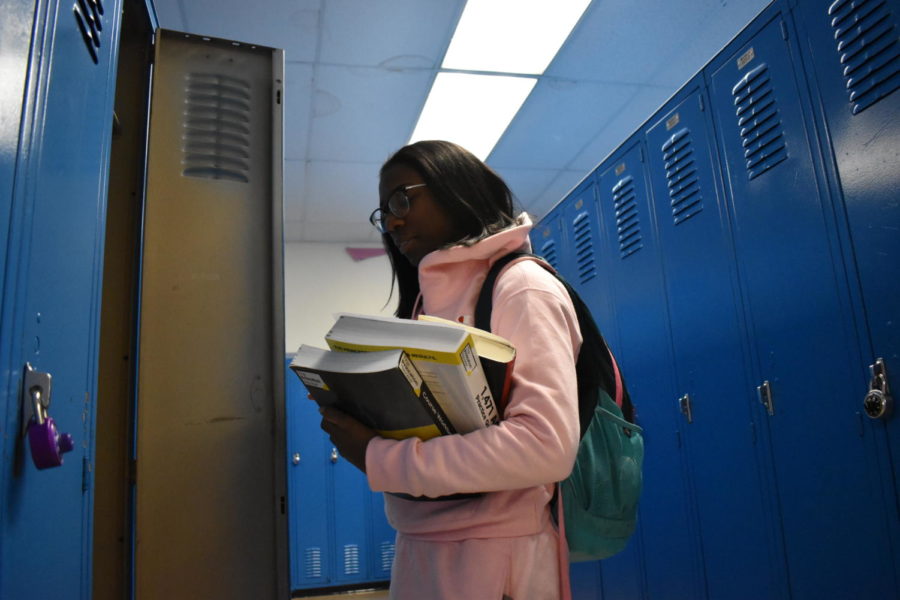“I have to sacrifice”: junior Meela Abby’s daily struggle for education
December 17, 2018
An assortment of books cradled in her arms, junior Meela Abby arranges belongings in her locker. Abby was enrolled in Parkway from kindergarten, hoping to study psychology upon graduating high school. “My sister went to school here and she told me that as soon as I come here, I need to start working. With my schedule you can’t procrastinate or things go bad,” Abby said. “If you want your education, you have to work hard. It doesn’t come easy.”
“Would you say you face discrimination at this school?”
Junior Meela Abby wastes no time to answer, punctuating her response before I can even finish asking the question.
“Yes, for sure.”
The conversation falls silent again, but Abby simply smiles before restocking the room with laughter in a matter of seconds.
“I don’t ignore it because that’s just not my personality to let somebody talk to me in that way,” Abby said. “Let’s just say after they do that, they don’t do it again.”
Abby has been awake since 4:45 a.m. She didn’t bother eating breakfast before catching the first of several bus rides on her daily schedule. A St. Louis City resident, Abby spends her mornings at South Technical High School’s cosmetology program before traveling to Parkway West for fourth through seventh hour.
“I don’t think [county students] think about how hard it is to live on a tight schedule like I do. They’re like, ‘oh, you can just do this after school.’ No, I can’t do this after school. I have to do it now,” Abby said. “They don’t understand that living in the city actually makes school 10 times harder. I have to sacrifice my time if I want a good education. There’s no way they can get buses that go shorter routes.”
The 90-plus minute bus ride creates a rigid schedule that restricts every facet of Abby’s high school experience, from academics to extracurricular activities to her social life.
“Things for Link Crew are before school, so I can never get to them because I live in the city. I don’t think there’s any way to get me to school earlier than I already am,” Abby said. “Some days I want to go out with my friends, but I can’t because between friends and homework I don’t have enough time to do both.”

Junior Meela Abby decorates a sweater at a Fashion Club meeting.
Without the flexibility to manage her course load and homework assignments like the average county student might, Abby seeks to make the most out of every waking second—often at the expense of much-needed sleep. She regularly falls well short of the recommended eight to 10 hours of sleep for adolescents.
“I really don’t get enough sleep. I have to wake up so early that to get enough sleep, I have to go to sleep super early, but with all the homework that [teachers] give me I go to sleep around 11:30 p.m.,” Abby said. “I only know a couple teachers that actually understand [the time constraints that city students face], but other than that, I don’t think they know. I think West should let teachers know which students live in the city so that if they do have a problem with getting work done, they’ll know there’s a reason why. I wish they could experience it for a day so they can see how we feel.”
In response to the concerns expressed by students like Abby, the African-American Student Acceleration Program (ASAP) presents a platform for greater interaction between the black student body and a nearly 90 percent white faculty.
“I’m in a group called ASAP and we have teachers and administrators there that hear our side of the story,” Abby said. “When they tell me to come in early before school [to discuss assignments or tests], I just have to tell them I can’t and I’ve got to figure it out by myself. I do most of my homework in school or try to do it on the bus, but it would help more if I could go to teachers.”
Her message to fellow city students: rather than lash out, convert your pent-up frustration into positive dialogues.
“Sometimes people who aren’t like me say things and they don’t understand my side of the story, which is why they say it, but instead of singling them out I try to help them fix it,” Abby said. “If they say something, I would be like, ‘this is wrong because you did this. It would be better if you said this instead of that.’ For the kids who are facing discrimination, I think you should also try to help the people that discriminate because if you do that, it will make the school a better place instead of making it worse by getting angry and yelling at them. Instead of using [discrimination] as a put down to make you feel bad, use it as motivation to prove them wrong.”
Abby plans to study psychology in college, and she has no doubt in her mind that attending Parkway schools since kindergarten has put her in a better position to act upon those dreams. The district wide 95.18 percent graduation rate in 2017 was more than 20 percentage points higher than St. Louis Public Schools’ 71.92 percent figure.
“I feel like West prepares us [for college] really well. Most people that go to West end up going to college and having a career in what they want to be in. They don’t only teach you the class, they tell you what you can do with this knowledge that they’re giving you,” Abby said. “[My friends attending city schools] mostly say they don’t do anything in school. I think there are some city schools that prepare you for college, but not all of them.”
Following a phase-out period that begins next school year, the Voluntary Interdistrict Choice Corporation (VICC) that provides city students transportation to suburban schools will stop admitting new applicants entirely in 2024.
Programs like VICC offer city students the opportunity to receive an empirically superior education than otherwise available to them. Parkway, for example, scored a 98.6 percent grade in its 2017 DESE Annual Performance Report compared to 68.2 percent for St. Louis Public Schools. Regarding average composite ACT scores, more adequately-funded county districts such as Parkway outpace St. Louis City’s public school system, 22.5 to 16.1.
Alongside thousands of her aspiring peers, Abby’s access to a quality education is slipping away.
“I want to ask people why they think cutting off desegregation programs is a good idea. I really think [ending VICC] is a mistake because schools in the city are not accredited the same as Parkway West and the schools out here,” Abby said. “I feel like stopping that is stopping the education of a lot of kids that have the potential to be great.”

